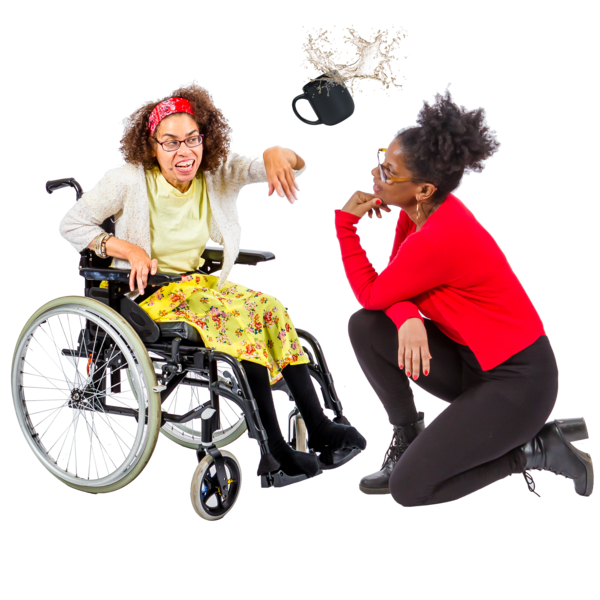Last night, BBC Radio 4's File on 4 programme was about Transforming Care and the use of restraints on adults with learning disabilities in hospital units in England.
The programme, called 'Transforming Care - Is it working?' focused on new data the BBC had acquired from NHS Digital that showed that the use of restraints in hospital units rose by almost 50% between 2016 and 2017.
The BBC investigation found that in 2016 restraints were used 15,000 times; in 2017 they were used 22,000 times, on average once every half hour.
The programme also explored the fact that the government’s
pledge
 A pledge is when someone promises to do something.
to move between 35% and 50% of people with learning disabilities and
autism
A pledge is when someone promises to do something.
to move between 35% and 50% of people with learning disabilities and
autism
 Autism is a disability. Autistic people find it difficult to understand what other people think and feel. They also find it difficult to tell people what they think and feel. Everyone with autism is different.
out of hospitals and into the
community
Autism is a disability. Autistic people find it difficult to understand what other people think and feel. They also find it difficult to tell people what they think and feel. Everyone with autism is different.
out of hospitals and into the
community
 A community is the people and places in an area.
by March 2019 is unlikely to be met.
A community is the people and places in an area.
by March 2019 is unlikely to be met.
Figures show the number of adults in inpatient units in England has only reduced from around 2,600 to 2,400 and the number of children in such units has almost doubled.
Mencap has been working with the
Challenging Behaviour
 Challenging behaviour can be when someone hurts themselves, hits or pinches someone else, or breaks something. Some people might behave like this because they are upset or because people do not understand them.
Foundation to continue to pressure the Government and NHS England to ensure real change happens for people with a
learning disability
Challenging behaviour can be when someone hurts themselves, hits or pinches someone else, or breaks something. Some people might behave like this because they are upset or because people do not understand them.
Foundation to continue to pressure the Government and NHS England to ensure real change happens for people with a
learning disability
 A learning disability is to do with the way someone's brain works. It makes it harder for someone to learn, understand or do things.
and their families.
A learning disability is to do with the way someone's brain works. It makes it harder for someone to learn, understand or do things.
and their families.
Responding to the new data and File on 4 programme, Dan Scorer, Head of Policy and Public Affairs at Mencap and Viv Cooper, CEO, Challenging Behaviour Foundation said:
The treatment of people with learning disabilities within these inpatient units is one of the biggest domestic human rights
Human rights
Rights are the things everyone should be allowed to do like have a say, or go to school. are the rights that everyone has. These include the right to go to school and the right to start a family. issues of our time. These horrific revelations reinforce the fact that the Government
The Government are the people who run the country. The Government decide how much tax people should pay and how things like the National Health Service (NHS) should work. and NHS England must urgently do a detailed analysis about where this is happening and why the use of restraints has increased so dramatically in recent years. It is recognised that people are at increased risk of neglect and abuse in these settings. Guidance
Guidance means being given clear instructions to be able to do something well. to reduce restrictive practices was published in 2014 by NHS England and is clearly not being implemented. NHS England are aware that this huge malpractice is taking place within units and it is a violation of people's human rights, yet we know they have not acted on it.
Restrictive interventions, such as physical and chemical restraint, can have a significant and life long traumatic impact. After Winterbourne View, the Government promised to transform care for people with learning disabilities. Seven years later, it is shocking to see so many people still locked up in these in-patient units and subjected to these kinds of treatments and it's clear that these promises set out by the Government are unlikely to be met.
-ENDS-
For further information, please contact the Mencap press office on 020 7696 5414 or media@mencap.org.uk.
About Mencap
There are 1.4 million people with a learning disability in the UK. Mencap works to support people with a learning disability, their families and carers by fighting to change laws, improve services and access to
education
 Education is when you learn things. When you fill in a form to get a job, education means you write where you went to school, college or university.
,
employment
Education is when you learn things. When you fill in a form to get a job, education means you write where you went to school, college or university.
,
employment
 Employment means having a job.
and
leisure
Employment means having a job.
and
leisure
 Leisure is when you have time to do things you enjoy like playing sports or going to the pub.
facilities. Mencap supports thousands of people with a learning disability to live their lives the way they want.
Leisure is when you have time to do things you enjoy like playing sports or going to the pub.
facilities. Mencap supports thousands of people with a learning disability to live their lives the way they want.
For advice and information about learning disability and Mencap services in your area, contact Mencap Direct on 0808 808 1111 (9am-5pm, Monday-Friday) or email help@mencap.org.uk
You can read more about our campaigning following the Winterbourne View Scandal here: www.mencap.org.uk/get-involved/campaign-mencap/current-campaigns/our-work-winterbourne-view.